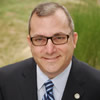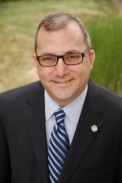Local
Tight Senate race for gay Virginia candidate
Del. Ebbin second in fundraising in expensive campaign


Adam Ebbin, who is leaving his spot as the only openly gay state delegate in Virginia, faces two strong opponents in his race for Senate. (Photo courtesy Adam Ebbin)
Virginia’s only openly gay delegate is fighting hard to become Virginia’s first openly gay state senator, in what’s shaping up to be a very expensive primary race among three Northern Virginia politicos in the 30th District.
Del. Adam Ebbin has represented the 49th District in the Virginia House of Delegates since 2004, and has been a progressive voice in state politics during his time in office. He’s looking to turn his eight-year record into a primary win this Aug. 23.
“I’m the only Democratic candidate with the record of standing up to Attorney General Ken Cuccinelli and his dangerous plans,” Ebbin said. “He’s advocated discrimination against gays, denied climate change [science], and has other radical ideas. I’ve written legislation to prevent him from continuing his civil actions without approval of the General Assembly or the governor.”
In June, when the Federal Reserve Bank in Richmond flew the rainbow flag for LGBT Pride month, Ebbin went head-to-head in the media with Republican Del. Bob Marshall, who took to the press denouncing the move, and wrote an open letter to the bank’s president calling the move “inappropriate.”
Ebbin was vocal in his response to Marshall, telling the New York Times, that life was improving for LGBT people in Virginia in spite of people like Marshall, who was sponsor of the bill to ban marriage equality in the Commonwealth, and last year made the claim that ending “Don’t Ask, Don’t Tell,” would lead to the spread of “venereal diseases” in the armed forces.
“[Adam Ebbin] persuaded two governors to issue executive orders protecting LGBT Virginians from discrimination in state employment,” a campaign release reads. “He led the effort to expand life insurance benefits to domestic partners.”
Ebbin’s modest campaign headquarters on Powhatan Street in North Old Town Alexandria has drawn, what Ebbin called, a “multitude of volunteers.”
“We have a number of students and a number of interns, a good number of democratic activists, seniors, democratic committee members, and GLBT people,” he said.
Ebbin’s supporters will be gathering on Monday night at Freddy’s Beach Bar in Arlington to raise money, show their support and raise awareness of the campaign to make Ebbin Virginia’s first openly gay state senator. Several sponsorship levels are available through the campaign, and tickets to attend the event are $50 in advance.
Ebbin has also received numerous endorsements recently including from Equality Virginia, Virginia Partisans Gay and Lesbian Democratic Club, the Gay and Lesbian Victory Fund and the Professional Firefighters and Paramedics Associations. The three candidates in the race have raised more than $500,000 in donations collectively, according to Mary Ann Barton, writing for Patch.com.
Ebbin, Libby Garvey and Rob Krupicka are vying for the seat being vacated by 16-year incumbent Patsy Ticer.
“It’s an open seat, because of her retirement,” Ebbin said. “It’s a very Democratic seat, strongly Democratic. The winner of the primary is expected to be the next senator”
Despite the stiff competition, Ebbin believes his organization is strong and will prevail.
“We’re getting a great reaction door-to-door,” Ebbin said. “We’re happy to be receiving more endorsements.”
Ebbin is pulling strong fundraising numbers as well. While Krupicka, an Alexandria City Council member, is in front, having raised more than $201,000, Ebbin’s campaign is close behind with more than $186,000.
The other candidate is Libby Garvey, a member of the Arlington School Board. Although trailing in third place in fundraising, Garvey received an important leg-up in the form of $20,000 in donations from Ticer.
Ebbin said he can be more effective in the Senate than in the lower chamber.
“I think that I can do a great job, and be even more effective,” he explained about making the jump to the Senate. “There’s an opportunity to be in an even smaller body — hopefully in the majority — and I think I’ll get more legislation passed, more done.”
Ebbin’s top legislative priorities in the Senate will make his progressive constituents very happy, saying, “renewable energy, transit, and non-discrimination in state hiring would be among the first.”
For information about the Ebbin for Virginia event at Freddy’s, contact [email protected].
Maryland
Md. Commission on LGBTQIA+ Affairs released updated student recommendations
LGBTQ students report higher rates of bullying, suicide

The Maryland Commission on LGBTQIA+ Affairs has released updated recommendations on how the state’s schools can support LGBTQ students.
The updated 16-page document outlines eight “actionable recommendations” for Maryland schools, supplemented with data and links to additional resources. The recommendations are:
- Developing and passing a uniform statewide and comprehensive policy aimed at protecting “transgender, nonbinary, and gender expansive students” against discrimination. The recommendation lists minimum requirements for the policy to address: name, pronoun usage, and restroom access.
- Requiring all educators to receive training about the specific needs of LGBTQ students, by trained facilitators. The training’s “core competencies” include instruction on terminology, data, and support for students.
- Implementing LGBTQ-inclusive curricula and preventing book bans. The report highlights a “comprehensive sexual education curriculum” as specifically important in the overall education curriculum. It also states the curriculum will “provide all students with life-saving information about how to protect themselves and others in sexual and romantic situations.”
- Establishing Gender Sexuality Alliances “at all schools and in all grade levels.” This recommendation includes measures on how to adequately establish effective GSAs, such as campaign advertising, and official state resources that outline how to establish and maintain a GSA.
- Providing resources to students’ family members and supporters. This recommendation proposes partnering with local education agencies to provide “culturally responsive, LGBTQIA+ affirming family engagement initiatives.”
- Collecting statewide data on LGBTQ youth. The data on Maryland’s LGBTQ youth population is sparse and non-exhaustive, and this recommendation seeks to collect information to inform policy and programming across the state for LGBTQ youth.
- Hiring a full-time team at the Maryland Department of Education that focuses on LGBTQ student achievement. These employees would have specific duties that include “advising on local and state, and federal policy” as well as developing the LGBTQ curriculum, and organizing the data and family resources.
- Promoting and ensuring awareness of the 2024 guidelines to support LGBTQ students.
The commission has 21 members, with elections every year, and open volunteer positions. It was created in 2021 and amended in 2023 to add more members.
The Governor’s Office of Communication says the commission’s goal is “to serve LGBTQIA+ Marylanders by galvanizing community voices, researching and addressing challenges, and advocating for policies to advance equity and inclusion.”
The commission is tasked with coming up with yearly recommendations. This year’s aim “to ensure that every child can learn in a safe, inclusive, and supportive environment.”
The Human Rights Campaign’s most recent report on LGBTQ youth revealed that 46.1 percent of LGBTQ youth felt unsafe in some school settings. Those numbers are higher for transgender students, with 54.9 percent of them saying they feel unsafe in school.
Maryland’s High School Youth Risk Behavior Survey reveals a disparity in mental health issues and concerns among students who identify as LGBTQ, compared to those who are heterosexual. LGBTQ students report higher rates of bullying, feelings of hopelessness, and suicidal thoughts. Nearly 36 percent of LGBTQ students report they have a suicide plan, and 26.7 percent of respondents say they have attempted to die by suicide.
The commission’s recommendations seek to combat the mental health crisis among the state’s LGBTQ students. They are also a call for local and state governments to work towards implementing them.
Virginia
Va. lawmakers consider partial restoration of Ryan White funds
State Department of Health in 2025 cut $20 million from Part B program

The Virginia General Assembly is considering the partial restoration of HIV funding that the state’s Department of Health cut last year.
The Department of Health in 2025 cut $20 million — or 67 percent of total funding — from the Ryan White Part B program.
The funding cuts started with the Trump-Vance administration passing budget cuts to federal HIV screening and protection programs. Rebate issues between the Virginia Department of Health and the company that provides HIV medications began.
Advocates say the funding cuts have disproportionately impacted lower-income people.
The Ryan White HIV/AIDS Program, a federal program started in 1990, provides medical services, public education, and essential services. Part B offers 21 services, seven of which remained funded after the budget cuts.
Equality Virginia notes “in 2025, a 67 percent reduction severely destabilized HIV services across the commonwealth.”
Virginia lawmakers have approved two bills — House Bill 30 and Senate Bill 30 — that would partially restore the funding. The Ryan White cuts remain a concern among community members.
Both chambers of the General Assembly must review their proposed changes before lawmakers can adopt the bills.
“While these amendments aren’t a full restoration of what community-based organizations lost, this marks a critical step toward stabilizing care for thousands of Virginians living with HIV,” said Equality Virginia Executive Director Narissa Rahaman. “Equality Virginia plans to continue their contact with lawmakers and delegates through the conference and up until the passing of the budget.”
“We appreciate lawmakers from both sides of the aisle who recognized the urgency of this moment and will work to ensure funding remains in the final version signed by the governor,” added Rahaman.
District of Columbia
D.C. Black Pride theme, performers announced at ‘Speakeasy’
Durand Bernarr to headline 2026 programming

The Center for Black Equity held its 2026 DC Black Pride Theme Reveal event at Union Stage on Monday. The evening, a “Speakeasy Happy Hour,” was hosted by Anthony Oakes and featured performances by Lolita Leopard and Keith Angelo. The Center for Black Equity organizes DC Black Pride.
Kenya Hutton, Center for Black Equity president and CEO, spoke following the performances by Leopard and Angelo. Hutton announced this year’s theme for DC Black Pride: “New Black Renaissance.”
Performers for 2026 DC Black Pride were announced to be Bang Garcon, Be Steadwell, Jay Columbus, Bennu Byrd, Rue Pratt and Akeem Woods.
Singer-songwriter Durand Bernarr was announced as the headliner for the 2026 festivities. Bernerr gave brief remarks through a video played on the screen at the stage.
DC Black Pride is scheduled for May 22-25. For more information on DC Black Pride, visit dcblackpride.org.




















